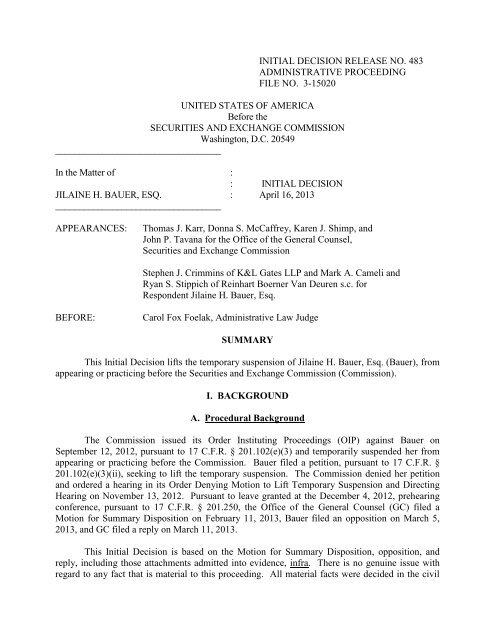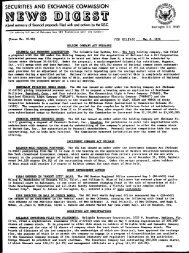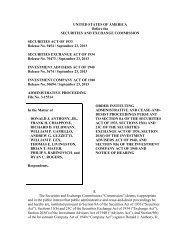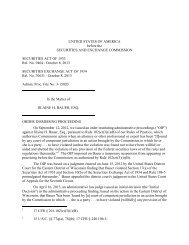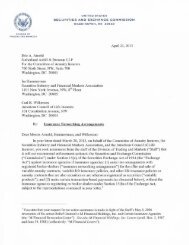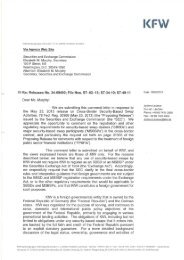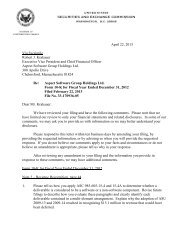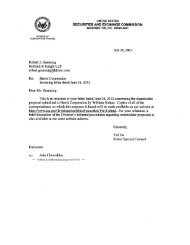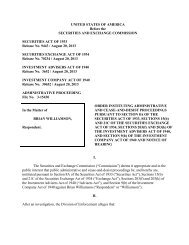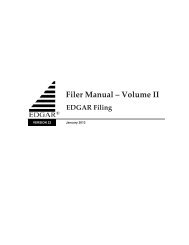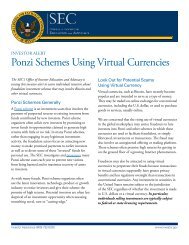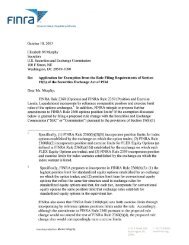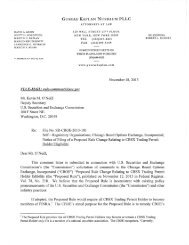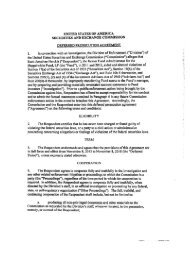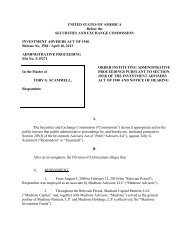Jilaine H. Bauer, Esq. - Securities and Exchange Commission
Jilaine H. Bauer, Esq. - Securities and Exchange Commission
Jilaine H. Bauer, Esq. - Securities and Exchange Commission
Create successful ePaper yourself
Turn your PDF publications into a flip-book with our unique Google optimized e-Paper software.
INITIAL DECISION RELEASE NO. 483<br />
ADMINISTRATIVE PROCEEDING<br />
FILE NO. 3-15020<br />
UNITED STATES OF AMERICA<br />
Before the<br />
SECURITIES AND EXCHANGE COMMISSION<br />
Washington, D.C. 20549<br />
___________________________________<br />
In the Matter of :<br />
: INITIAL DECISION<br />
JILAINE H. BAUER, ESQ. : April 16, 2013<br />
___________________________________<br />
APPEARANCES:<br />
Thomas J. Karr, Donna S. McCaffrey, Karen J. Shimp, <strong>and</strong><br />
John P. Tavana for the Office of the General Counsel,<br />
<strong>Securities</strong> <strong>and</strong> <strong>Exchange</strong> <strong>Commission</strong><br />
Stephen J. Crimmins of K&L Gates LLP <strong>and</strong> Mark A. Cameli <strong>and</strong><br />
Ryan S. Stippich of Reinhart Boerner Van Deuren s.c. for<br />
Respondent <strong>Jilaine</strong> H. <strong>Bauer</strong>, <strong>Esq</strong>.<br />
BEFORE:<br />
Carol Fox Foelak, Administrative Law Judge<br />
SUMMARY<br />
This Initial Decision lifts the temporary suspension of <strong>Jilaine</strong> H. <strong>Bauer</strong>, <strong>Esq</strong>. (<strong>Bauer</strong>), from<br />
appearing or practicing before the <strong>Securities</strong> <strong>and</strong> <strong>Exchange</strong> <strong>Commission</strong> (<strong>Commission</strong>).<br />
I. BACKGROUND<br />
A. Procedural Background<br />
The <strong>Commission</strong> issued its Order Instituting Proceedings (OIP) against <strong>Bauer</strong> on<br />
September 12, 2012, pursuant to 17 C.F.R. § 201.102(e)(3) <strong>and</strong> temporarily suspended her from<br />
appearing or practicing before the <strong>Commission</strong>. <strong>Bauer</strong> filed a petition, pursuant to 17 C.F.R. §<br />
201.102(e)(3)(ii), seeking to lift the temporary suspension. The <strong>Commission</strong> denied her petition<br />
<strong>and</strong> ordered a hearing in its Order Denying Motion to Lift Temporary Suspension <strong>and</strong> Directing<br />
Hearing on November 13, 2012. Pursuant to leave granted at the December 4, 2012, prehearing<br />
conference, pursuant to 17 C.F.R. § 201.250, the Office of the General Counsel (GC) filed a<br />
Motion for Summary Disposition on February 11, 2013, <strong>Bauer</strong> filed an opposition on March 5,<br />
2013, <strong>and</strong> GC filed a reply on March 11, 2013.<br />
This Initial Decision is based on the Motion for Summary Disposition, opposition, <strong>and</strong><br />
reply, including those attachments admitted into evidence, infra. There is no genuine issue with<br />
regard to any fact that is material to this proceeding. All material facts were decided in the civil
case against <strong>Bauer</strong> on which this proceeding is based. Any other facts in her pleadings have been<br />
taken as true, pursuant to 17 C.F.R. § 201.250(a). All arguments <strong>and</strong> proposed findings <strong>and</strong><br />
conclusions that are inconsistent with this decision were considered <strong>and</strong> rejected.<br />
B. Allegations <strong>and</strong> Arguments of the Parties<br />
The OIP alleges that <strong>Bauer</strong> was adjudged to have violated the antifraud provisions of the<br />
federal securities laws, based on insider trading in the shares of the Short Duration High-Yield<br />
Municipal Fund of Heartl<strong>and</strong> Group, Inc. GC urges that <strong>Bauer</strong> be disqualified from appearing or<br />
practicing before the <strong>Commission</strong> for a lengthy period. <strong>Bauer</strong> urges that the proceeding be<br />
dismissed.<br />
1. Exhibits Admitted into Evidence<br />
C. Procedural Issues<br />
The following items, of which official notice is taken pursuant to 17 C.F.R. §§ 201.250(a),<br />
.323, which are also included in GC’s Motion for Summary Disposition <strong>and</strong> <strong>Bauer</strong>’s opposition,<br />
are admitted into evidence: 1<br />
March 31, 2011, Order Denying in Part <strong>and</strong> Granting in Part Defendant’s<br />
Motion for Summary Judgment <strong>and</strong> Granting in Part <strong>and</strong> Denying in Part<br />
Plaintiff’s Cross Motion for Summary Judgment in SEC v. <strong>Bauer</strong>, No. 2:03-<br />
cv-01427 (E.D. Wis.) (GC Ex. 1, <strong>Bauer</strong> Ex. C); <strong>and</strong><br />
May 25, 2011, Decision on Cross Motions for Summary Judgment on the<br />
Insider Trading Claim in SEC v. <strong>Bauer</strong>, No. 2:03-cv-01427 (E.D. Wis.) (GC<br />
Ex. 2, <strong>Bauer</strong> Ex. D); <strong>and</strong><br />
June 15, 2012, Decision <strong>and</strong> Order Denying Plaintiff United States<br />
<strong>Securities</strong> <strong>and</strong> <strong>Exchange</strong> <strong>Commission</strong>’s Motion for Final Judgment of<br />
Permanent Injunction <strong>and</strong> Granting in Part Other Relief Against Defendant<br />
<strong>Jilaine</strong> H. <strong>Bauer</strong> in SEC v. <strong>Bauer</strong>, No. 2:03-cv-01427 (E.D. Wis.) (GC Ex. 3,<br />
<strong>Bauer</strong> Ex. G).<br />
2. Collateral Estoppel<br />
The <strong>Commission</strong> does not permit issues that were addressed in a previous civil proceeding<br />
against a respondent to be relitigated in an administrative proceeding against the same respondent.<br />
See James E. Franklin, <strong>Exchange</strong> Act Release No. 56649 (Oct. 12, 2007), 91 SEC Docket 2708,<br />
2713 & n.13; John Francis D’Acquisto, Advisers Act Release No. 1696 (Jan. 21, 1998), 53 S.E.C.<br />
440, 444 & n.9; Demitrios Julius Shiva, <strong>Exchange</strong> Act Release No. 38389 (Mar. 12, 1997), 52<br />
S.E.C. 1247, 1249 & nn.6-7. Nor does the pendency of an appeal preclude the <strong>Commission</strong> from<br />
1 The parties attached many other exhibits to their pleadings, but this Initial Decision relies on<br />
these three exhibits.<br />
2
action based on a court’s finding that the respondent violated the securities laws. See Franklin, 91<br />
SEC Docket at 2714 n.15.<br />
3. Statute of Limitations<br />
Citing Gabelli v. SEC, 133 S. Ct. 1216 (2013), <strong>Bauer</strong> argues that the proceeding was not<br />
instituted within the five-year statute of limitations provided in 28 U.S.C. § 2462 because the<br />
conduct underlying the violation occurred in 2000. This argument fails. The predicate for this<br />
proceeding, pursuant to 17 C.F.R. § 201.102(e)(3), is the May 25, 2011, finding by the U.S.<br />
District Court for the Eastern District of Wisconsin that <strong>Bauer</strong> violated the securities laws. 2 While<br />
the five-year statute of limitations commences with the underlying wrongdoing for a proceeding<br />
brought pursuant to 17 C.F.R. § 201.102(e)(1)(ii), the <strong>Commission</strong> may choose to bring an action<br />
pursuant to 17 C.F.R. § 201.102(e)(3), as it did here, rather than 17 C.F.R. § 201.102(e)(1)(ii).<br />
Michael C. Pattison, CPA, <strong>Exchange</strong> Act Release No. 67900 (Sept. 20, 2012), 104 SEC Docket<br />
58890, 58897-902.<br />
<strong>Bauer</strong> also argues that this proceeding is time-barred because it was not brought within<br />
ninety days of the March 31, 2011, ruling 3 that <strong>Bauer</strong> violated the securities laws, quoting 17<br />
C.F.R. § 201.102(e)(3): “No order of temporary suspension shall be entered by the <strong>Commission</strong><br />
pursuant to paragraph (e)(3)(1) of this rule more than 90 days after the date on which the final<br />
judgment or order entered in a judicial or administrative proceeding described in paragraph<br />
(e)(3)(i)(A) or (e)(3)(i)(B) has become effective.” However, that provision continues: “whether<br />
upon completion of review or appeal procedures or because further review or appeal procedures<br />
are no longer available.” <strong>Bauer</strong>’s appeal to the Court of Appeals for the Seventh Circuit is<br />
currently pending. SEC v. <strong>Bauer</strong>, No. 12-2860 (7th Cir. argued Feb. 12, 2013).<br />
II. FINDINGS OF FACT<br />
<strong>Bauer</strong> has been found by the U.S. District Court for the Eastern District of Wisconsin in an<br />
action brought by the <strong>Commission</strong> to have violated the antifraud provisions of the federal<br />
securities laws, specifically Section 17(a) of the <strong>Securities</strong> Act of 1933 <strong>and</strong> Section 10(b) of the<br />
<strong>Securities</strong> <strong>Exchange</strong> Act of 1934 <strong>and</strong> Rule 10b-5 thereunder. SEC v. <strong>Bauer</strong>, No. 2:03-cv-01427<br />
(E.D. Wis. May 25, 2011). 4 <strong>Bauer</strong>’s wrongdoing consisted of insider trading in the shares of the<br />
2 In Gabelli, the Court held that, for the Government in a civil penalty enforcement action, the<br />
five-year period commences when the fraud occurs, not when it is discovered. The <strong>Commission</strong><br />
brought the case on which this proceeding is based, SEC v. Heartl<strong>and</strong> Advisors, Inc., et al., No.<br />
2:03-cv-01427, in 2003, within five years of wrongdoing that occurred in 2000.<br />
3 GC Ex. 2, <strong>Bauer</strong> Ex. C. This brief Order found, summarily, that <strong>Bauer</strong> “engaged in insider<br />
trading.” Id. The court’s thirty-nine page May 25, 2011, Decision contained findings of fact <strong>and</strong><br />
concluded that <strong>Bauer</strong> violated Section 17(a) of the <strong>Securities</strong> Act of 1933 <strong>and</strong> Section 10(b) of the<br />
<strong>Securities</strong> <strong>Exchange</strong> Act of 1934 <strong>and</strong> Rule 10b-5 thereunder. GC Ex. 3, <strong>Bauer</strong> Ex. D.<br />
4 As originally filed against ten defendants, including <strong>Bauer</strong>, the case was captioned SEC v.<br />
Heartl<strong>and</strong> Advisors, Inc., et al.<br />
3
Short Duration High-Yield Municipal Fund of Heartl<strong>and</strong> Group, Inc. (HGI), a registered<br />
investment company. Id. During the relevant period, <strong>Bauer</strong> was a vice president of HGI <strong>and</strong><br />
general counsel, chief compliance officer, secretary, <strong>and</strong> vice president of Heartl<strong>and</strong> Advisors,<br />
Inc., a registered investment adviser <strong>and</strong> HGI’s portfolio manager. Id. The court ordered<br />
disgorgement of $20,033.25 plus prejudgment interest, representing losses avoided through the<br />
violative trading. SEC v. <strong>Bauer</strong>, No. 2:03-cv-01427 (E.D. Wis. June 15, 2012). The court<br />
declined to enjoin <strong>Bauer</strong>, citing factors set forth in SEC v. Holschuh, 694 F.2d 130, 144 (7th Cir.<br />
1982). Id. The court also declined to award a civil penalty requested by the <strong>Commission</strong>, finding<br />
“<strong>Bauer</strong> has paid a high price for her conduct. Inasmuch as she has remained unemployed or<br />
underemployed, she has not been able to cover living expenses, including medical bills, <strong>and</strong> has<br />
been forced to draw from retirement to pay her defense costs amassing over the past nine years.”<br />
Id. The court stated that it “[c]onsider[ed] the totality of the circumstances <strong>and</strong> [believed] that the<br />
litigation alone is an adequate deterrent in this case.” Id.<br />
III. CONCLUSIONS OF LAW<br />
<strong>Bauer</strong> has been “found by [a] court of competent jurisdiction in an action brought by the<br />
<strong>Commission</strong> to which . . . she is a party . . . to have violated [willfully] any provision of the<br />
Federal securities laws or of the rules <strong>and</strong> regulations thereunder” within the meaning of 17 C.F.R.<br />
§ 201.102(e)(3)(i)(B).<br />
IV. SANCTION<br />
GC urges that <strong>Bauer</strong> be disqualified from appearing or practicing before the <strong>Commission</strong><br />
for a lengthy period. <strong>Bauer</strong> urges that the proceeding be dismissed. For the reasons set forth below,<br />
no further sanction will be ordered, <strong>and</strong> the temporary suspension will be lifted.<br />
A. Sanction Considerations<br />
The <strong>Commission</strong> determines sanctions in a proceeding pursuant to 17 C.F.R. § 201.102(e)<br />
according to the so-called Steadman factors, 5 <strong>and</strong> it also considers deterrence. 6 Steven Altman,<br />
<strong>Esq</strong>., <strong>Exchange</strong> Act Release No. 63306 (Nov. 10, 2010), 99 SEC Docket 34405, 34435, petition<br />
5 The Steadman factors are:<br />
the egregiousness of the defendant’s actions, the isolated or recurrent nature of the<br />
infraction, the degree of scienter involved, the sincerity of the defendant’s assurances<br />
against future violations, the defendant’s recognition of the wrongful nature of his<br />
conduct, <strong>and</strong> the likelihood that the defendant’s occupation will present opportunities<br />
for future violations.<br />
Steadman v. SEC, 603 F.2d 1126, 1140 (5th Cir. 1979) (quoting SEC v. Blatt, 583 F.2d 1325, 1334<br />
n.29 (5th Cir. 1978)).<br />
6 Accord Pattison, 104 SEC Docket at 58903. Pattison was brought under 17 C.F.R. §<br />
201.102(e)(3), while Altman was brought under 17 C.F.R. § 201.102(e)(1)(ii).<br />
4
for review denied, 666 F.3d 1322 (D.C. Cir. 2011). In SEC v. <strong>Bauer</strong>, the court considered factors<br />
specified in Holschuh <strong>and</strong> deterrence. The Holschuh factors 7 are identical to the Steadman factors<br />
with this exception: the Steadman factors include “the egregiousness of the defendant’s actions,”<br />
which the Holschuh factors do not, instead including “the gravity of harm caused by the offense.”<br />
Thus, collateral estoppel does not apply to “the egregiousness” of <strong>Bauer</strong>’s actions, <strong>and</strong> the<br />
undersigned is not estopped from evaluating this factor. The <strong>Commission</strong> considers violations of<br />
the antifraud provisions to be particularly reprehensible. Marshall E. Melton, Advisers Act<br />
Release No. 2151 (July 25, 2003), 56 S.E.C. 695, 709-10. Thus, <strong>Bauer</strong>’s conduct must be<br />
considered egregious <strong>and</strong> a sanction is appropriate in this proceeding despite the court’s rulings in<br />
SEC v. <strong>Bauer</strong>. The seven-month suspension that <strong>Bauer</strong> has already served is appropriate in the<br />
circumstances. Accordingly, the temporary suspension will be lifted.<br />
V. ORDER<br />
IT IS ORDERED that the temporary suspension entered on September 12, 2012, of JILAINE<br />
H. BAUER, ESQ., from appearing or practicing before the <strong>Commission</strong> IS LIFTED.<br />
This Initial Decision shall become effective in accordance with <strong>and</strong> subject to the<br />
provisions of Rule 360 of the <strong>Commission</strong>’s Rules of Practice, 17 C.F.R. § 201.360. Pursuant to<br />
Rules 102(e)(3)(iii) <strong>and</strong> 540 of the <strong>Commission</strong>’s Rules of Practice, 17 C.F.R. §§<br />
201.102(e)(3)(iii), .540, a party may file a petition for review of this Initial Decision within ten<br />
days after service of the Initial Decision. The Initial Decision will not become final until the<br />
<strong>Commission</strong> enters an order of finality. The <strong>Commission</strong> will enter an order of finality unless a<br />
party files a petition for review or a motion to correct a manifest error of fact or the <strong>Commission</strong><br />
determines on its own initiative to review the Initial Decision as to a party. If any of these events<br />
occur, the Initial Decision shall not become final as to that party.<br />
__________________________________<br />
Carol Fox Foelak<br />
Administrative Law Judge<br />
7 The Holschuh factors are:<br />
the totality of the circumstances surrounding the defendant <strong>and</strong> his violation,<br />
including such factors as the gravity of harm caused by the offense; the extent of<br />
the defendant’s participation <strong>and</strong> his degree of scienter; the isolated or recurrent<br />
nature of the infraction <strong>and</strong> the likelihood that the defendant’s customary business<br />
activities might again involve him in such transactions; the defendant’s recognition<br />
of his own culpability; <strong>and</strong> the sincerity of his assurances against future violations.<br />
[citations omitted].<br />
Holschuh, 694 F.2d at 144 (citations omitted).<br />
5


